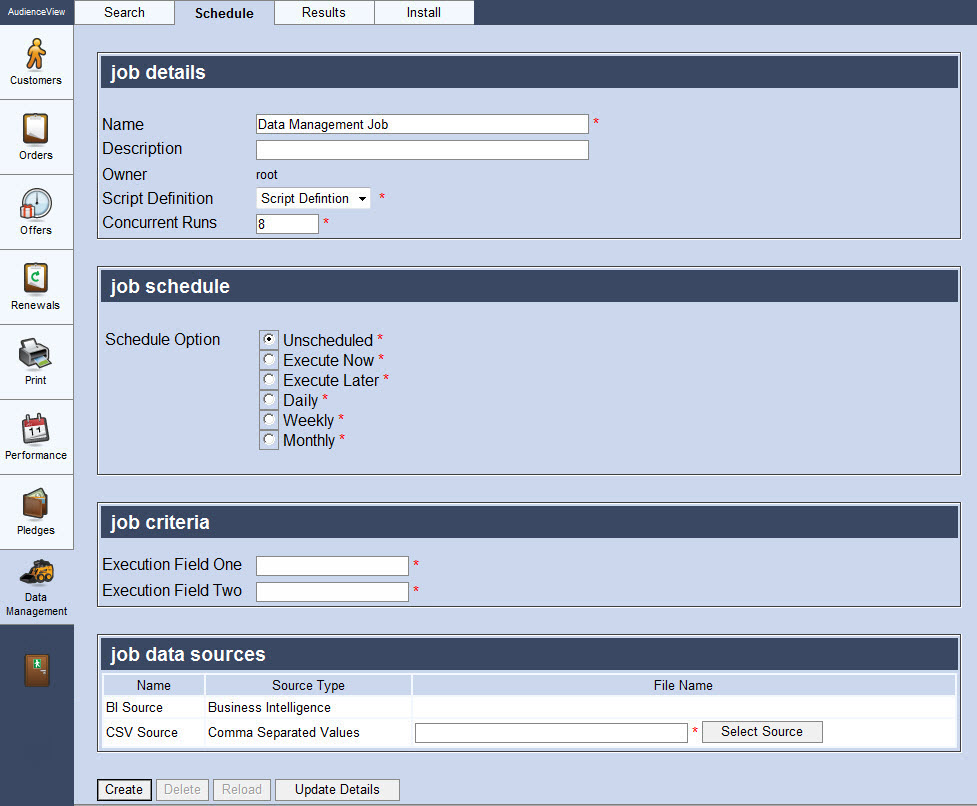Data management is the utility used to load migration items. The data management uses the AudienceView API (application programming interface) and follows the same rules defined against a standard user login.
The following image illustrates the Utilities application Data Management|Schedule page:

The Data Management|Schedule Page
The Data Management|Schedule page displays the details of a data managment job, and provides the name of the associated script used for the job.
Job Details Section
The following image illustrates the job details section of the Utilities application Data Management|Schedule page:

The job details section of the Utilities application Data Management|Schedule page consistes of the following properties:
|
Field |
Description |
|
Name |
Enter the name for the data management job. |
|
Description |
Enter a brief description of the data management job. |
|
Owner |
This is a read-only field that displays the user name of the person who created the job. |
|
Script Defintion |
Select the script definition that you want to use for the data management job.
Script definitons only appear in this list once they have been created in the General Configuration application Script Definition|Edit page. For more information, refer to General Configuration - Script Definitions. |
|
Concurrent Runs |
This field is no longer availabel as of AudienceView 6.8.12 and is now set to 1 in the Registry, by default.
This is the number of concurrent threads that will be run.
Changing this number is not recommended. |
Job Schedule Section
The following image illustrates the job schedule section of the Utilities application Data Management|Schedule page:

You are given several scheduling options allowing you to pick when you would like the data management job to be run:
-
Unscheduled: Saves the data management job, but does not run it.
-
Execute Now: Runs the data management job immediately.
-
Execute Later: Runs the data management job at a pre-defined date and time.
-
Daily: Runs the data management job daily at a specified time. You can define the valid start and end dates.
-
Weekly: Runs the data management job on a specified day or days of the week as well as a specific time during that day. You can define the valid start and end dates.
-
Monthly: Runs the data management job on a specified day of the month as well as a specific time during that day. You can define the valid start and end dates.
 |
Hint
After you run a data management job using Execute Now or Execute Later, the schedule reverts to Unscheduled. |
Job Criteria Section
Once you select a script definition from the 'Script' dropdown, the job criteria section of the Utilities application Data Management|Schedule page appears.
The job criteria section of the Utilities application Data Management|Schedule page displays the execution fields that were configured in the execution fields section of the script's General Configuration application Script Defintions|Edit page. If the execution fields were configured into 'Groups' they will be split up accordingly in this section.
The following image illustrates the job criteria section of the Utilities application Data Management|Schedule page:

Job Data Sources Section
Once you have selected a script from the 'Script' dropdown, the job data sources section of the Utilities application Data Management|Schedule page appears. The job data sources section allows you to upload a .CSV source file on the server or select an existing .CSV source file for the data management job, providing that Comma Separated Values has been selected from the 'Source Type' dropdown on the Utilities application Script Defintions|Edit page.
